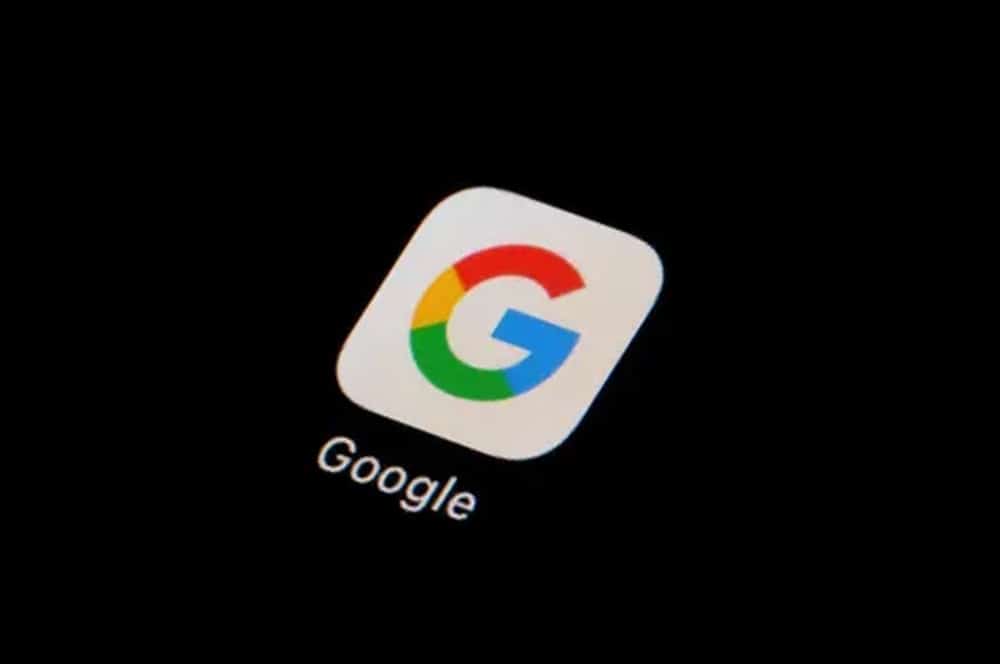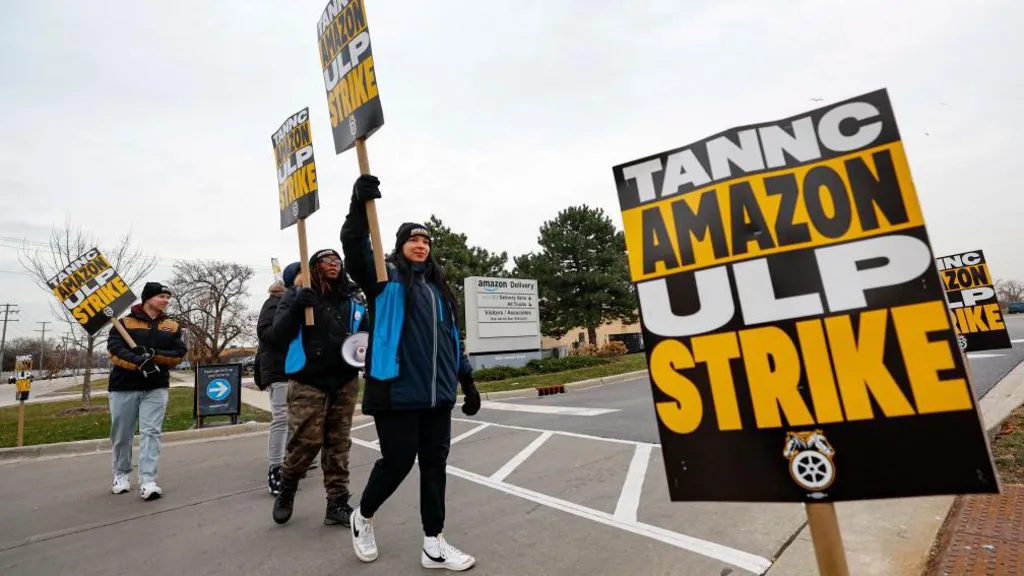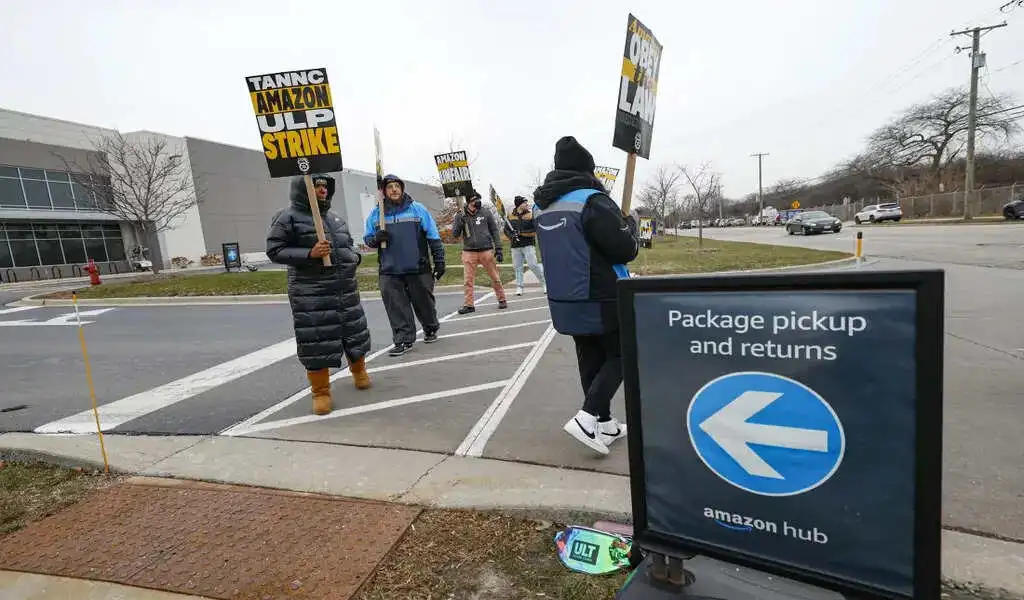Business
Google Agreed To Pay Millions For California News. Journalists Call It A Bad Deal

SACRAMENTO, CA – Google will soon give California millions of dollars to help pay for local journalism positions in a first-of-its-kind pact, but journalists and other media industry professionals call it a disappointing agreement that mostly favors the tech behemoth.
The pact, reached behind closed doors and unveiled last week, will allocate tens of millions of public and private cash to keep local news organizations afloat. Critics argue that it is a textbook political maneuver by internet titans to dodge a tax under what could have been historic legislation. California lawmakers decided to scrap a bill forcing tech companies to support the news outlets they profit from in exchange for Google’s financial commitment.
According to Victor Pickard, a professor of media policy and political economy at the University of Pennsylvania, by delaying the bill, the state effectively abandoned an avenue that may have obliged Google and social media platforms to provide recurring payments to publishers for linking to news material. He added that California also left behind a significantly larger sum of money that could have been secured under the legislation.
Google Agreed To Pay Millions For California News. Journalists Call It A Bad Deal
“Google got off easy,” Pickard explained.
Google stated that the agreement would benefit both the media and the artificial intelligence sector in California.
“This public-private partnership builds on our long history of working with journalism and the local news ecosystem in our home state, while developing a national centre of excellence on AI policy,” Kent Walker, president of global affairs and chief legal officer at Google’s parent company Alphabet, said in a statement.
State governments around the United States have been working to support faltering news organizations. The newspaper industry in the United States has declined for many years, with traditional economic models crumbling and advertising revenues drying up in the digital age.
As news organizations shift from print to digital, they increasingly rely on Google and Facebook to deliver their material. While publishers’ advertising earnings have plummeted over the previous few decades, Google’s search engine has become the center of a digital advertising empire worth more than $200 billion annually.
According to its owner, the Los Angeles Times was losing up to $40 million a year, which justified laying off more than 100 people earlier this year.
According to a report from Northwestern University’s Medill School of Journalism, more than 2,500 newspapers have disappeared since 2005, and around 200 counties in the United States lack local news outlets.
California and New Mexico are financing local journalism fellowship programs. This year, New York became the first state to offer a tax credit program to help news outlets attract and retain journalists. Illinois is exploring legislation identical to the one that was lost in California.
Here’s a closer look at the agreement California reached with Google this week:
What does the agreement entail?
The $250 million deal will finance two efforts: journalism projects and a new AI research program. The pact only guaranteed funds for five years.
Google will provide approximately $110 million, with the state budget contributing $70 million, to increase journalism career opportunities. The fund will be overseen by UC Berkeley’s Graduate School of Journalism. According to Assemblymember Buffy Wicks, who arranged the agreement, Google will also contribute $70 million to fund the AI research initiative, which would develop tools to help tackle “real-world problems. ”
The agreement is not a tax, which is a striking contrast to a law Wicks proposed that would have imposed a “link tax” mandating corporations such as Google, Facebook, and Microsoft to pay a proportion of advertising revenue to media organizations in exchange for connecting to their material. The plan was patterned after Canadian legislation requiring Google to pay approximately $74 million annually to fund journalism.
Why are tech corporations agreeing on this now?
Tech companies have spent the previous two years battling Wicks’ measure, mounting costly opposition campaigns and airing advertisements criticizing the law. In April, Google threatened to temporarily restrict news websites from some California consumers’ search results. The bill has been moving forward with bipartisan backing until this week.
Wicks told The Associated Press on Thursday that she saw no way forward with her measure and that the funds obtained under the agreement “are better than zero.”
“This represents politics is the art of the possible,” the politician stated.
Google Agreed To Pay Millions For California News. Journalists Call It A Bad Deal
“Google cannot exit from news because they need it,” said Anya Schiffrin, a Columbia University professor who studies global media and co-wrote a working paper on how much Google and Meta owe news publishers. “So what they are doing is using a whole lot of different tactics to kill bills that will require them to compensate publishers fairly.”
She calculates that Google owes California publishers $1.4 billion each year. Google disagrees with Schiffrin’s conclusions. According to a spokeswoman, news queries make up less than 2% of all searches and do not generate revenue for Google.
Why are journalists and labor unions opposing the agreement?
The Media Guild of the West, a union representing journalists in Southern California, Arizona, and Texas, stated that journalists were excluded from the discourse. The union supported Wicks’ bill but was not involved in the negotiations with Google.
“The future of journalism should not be decided in backroom deals,” the union’s letter to lawmakers states. “The Legislature tried unsuccessfully to restrict monopolies. Now we wonder if the state has caused more harm than good.”
According to a letter from the union to Wicks earlier this week, the arrangement results in significantly less cash than Google provides to Canadian newsrooms and contradicts Google’s goal of rebalancing its control over local news organizations.
Others questioned why the agreement contained funds to develop new AI tools. They view it as another opportunity for tech corporations to eventually replace them. Wicks’ original bill did not include AI provisions.
Some news organizations, including the California News Publishers Association, Local Independent Online News Publishers, and California Black Media, have supported the pact.
What happens next?
The pact is set to take effect next year, with $100 million to jumpstart the efforts.
Wicks stated that the terms of the arrangement are still being worked out. According to Wicks, California Gov. Gavin Newsom has committed to including journalistic financing in his January budget, but reservations from other Democratic leaders may jeopardise the proposal.
SOURCE | AP
Business
Sonic the Hedgehog Dominates Christmas Wish Lists

Sonic the Hedgehog is dominating Christmas wish lists this year. The lovable blue hedgehog is back in the spotlight, from sonic the hedgehog toys and games to sonic the hedgehog coloring pages and movie hype.
Sonic-themed holiday merchandise is on fire, from quirky sweaters to action figures flying off shelves. Sonic the Hedgehog Christmas outfits for kids are selling out fast, making them a go-to gift option for festive fun.
Retailers have been quick to recognize Sonic’s holiday appeal. Special promotions and exclusive items, like the Sonic holiday t-shirts, are everywhere.
Everyone’s stocking up on Sonic merchandise, from big-box stores to boutique retailers.
Online shopping platforms are seeing a surge in searches for Sonic items. Whether it’s Sonic Christmas-themed tops or Sonic the Hedgehog coloring pages, Sonic the Hedgehog toys or Sonic and the Hedgehog 3, the demand is skyrocketing.
Retailers who tap into this trend are sure to see strong holiday sales.
Sonic has been around since the early 90s, but his popularity never wanes. With the release of Sonic 3, fans are more excited than ever.
Sonic the Hedgehog 4
Meanwhile, Paramount Pictures is preparing “Sonic the Hedgehog 4,” with the newest addition in the family-friendly genre set for a spring 2027 release.
The announcement comes as “Sonic 3” opens in theatres on Friday, estimated to gross $55 million to $60 million from 3,800 North American locations.
The sequel is shaping up to be a good holiday season blockbuster for Paramount, which explains the desire in future “Sonic” adventures. On the international front, the film will be released on Christmas Day in 52 markets.
On Rotten Tomatoes, critics gave “Sonic 3” an outstanding 87% fresh score.
The first two films grossed a total of $725.2 million at the global box office and generated over $180 million in global consumer expenditure through home entertainment rentals and digital purchases.
They also inspired a spinoff Paramount+ series, “Knuckles,” which premiered earlier this year.
Related News:
Man Creates Candy Cane Car to Spread Christmas Cheer
Business
Amazon Strike Called By Teamsters Union 10,000 Walkout

An Amazon strike has hit facilities in the United States in an effort by the Teamsters union to pressure the corporation for a labour agreement during a peak shopping season.
The Teamsters union told the Associated Press that Amazon delivery drivers at seven facilities in the United States walked off the job on Thursday after the firm failed to discuss a labour contract.
According to the union, Amazon employees in Teamsters union jackets were protesting at “hundreds” of additional Amazon facilities, which the union billed as the “largest strike” in US history involving the company.
The corporation, which employs over 800,000 people in its US delivery network, stated that its services will be unaffected.
It was unclear how many people, including members of Germany’s United Services Union, participated in Thursday’s demonstration. The Teamsters union reported that thousands of Amazon employees were implicated in the United States.
Amazon Strike at 10 Locations
Overall, the group claims to represent “nearly 10,000” Amazon strikers, having signed up thousands of people at roughly ten locations across the country, many of whom have joined in recent months.
The organization has claimed recognition from Amazon going on strike, claiming the firm illegally neglected its obligation to bargain collectively over salary and working conditions.
The Teamsters is a long-standing US union with nearly one million members. It is well-known for securing lucrative contracts for its members at companies like delivery behemoth UPS.
Most of the Teamsters’ Amazon campaigns have concerned drivers working for third-party delivery companies that partner with the tech behemoth.
Amazon denies that it is liable as an employer in those circumstances, which is a point of legal contention. In at least one case, labour officials have taken a preliminary stance in favour of the union.
Stalled Contract Negotiations
Amazon employees at a major warehouse on Staten Island in New York have also chosen to join the Teamsters. Their warehouse is the only Amazon facility in the United States where labour officials have formally recognized a union win.
However, the Amazon strike is because contract negotiations have not progressed since the 2022 vote. It was not one of the areas scheduled to go on strike on Thursday.
Amazon, one of the largest employers in the United States, has long received criticism for its working conditions and has been the target of activists seeking to gain traction among its employees.
Related News:
Amazon Releases Nova, a Fresh Set of Multimodal AI Models.
Business
Amazon Encounters Numerous Strikes As Unions Aim At The Holiday Shopping Surge.

(VOR News) – Thousands of Amazon employees at various sites across the country were scheduled to go on strike on Thursday in an effort by the Teamsters union to pressure the retail behemoth to acknowledge its unionised workers in the United States.
The walkout is expected to concentrate on seven Amazon locations across the country during the holiday purchasing surge and may be the most significant union action against Amazon in the nation’s history.
The business announced on Thursday morning that there had been no effect on operations. It also stated that it is “continuing to concentrate on fulfilling customers’ holiday orders.”
The International Brotherhood of Teamsters maintains that it represents more than 10,000 Amazon employees and contractors in aviation centres, warehouses, and delivery centres.
Amazon has refused to acknowledge the union for many years.
The retail giant, which employs approximately 1.5 million individuals, excludes contractors and part-timers. A strike has been initiated by delivery couriers and warehouse employees at seven distinct locations in order to exert pressure on the company to negotiate a collective bargaining agreement that would encompass modifications to compensation, amenities, and working conditions.
Picketing was intended for New York, Atlanta, Los Angeles, San Francisco, and Skokie, Illinois.
Also, the Teamsters assert that they are establishing picket lines at “hundreds” of additional warehouses and delivery centres by encouraging non-unionized workers to picket under U.S. labour law, which protects workers’ ability to take collective action to further their interests.
“Amazon workers are exercising their power,” Randy Korgan stated to NPR.
“They now realise there is a pathway to take on a corporate giant like this – and that they hold the power.” Amazon responds by accusing the Teamsters of fabricating information regarding the strikes, asserting that the participants are “entirely” outsiders rather than employees or subcontractors of the corporation.
Amazon spokesperson Kelly Nantel stated that “the reality is that they were unable to secure sufficient support from our employees and partners and have invited external parties to harass and intimidate our team.” For more than a year, the Teamsters have been intentionally misleading the public by claiming to represent “thousands of employees and drivers.” They do not.
The Teamsters did not provide a specific duration for the strike; however, they informed NPR that it would extend beyond one day. Workers would receive $1,000 per week in strike money, as per the union.
Teamsters President Sean O’Brien issued a statement in which he stated, “If your package is delayed during the holidays, you can attribute it to Amazon’s insatiable greed.” We established a firm deadline for Amazon to attend the meeting and treat our members equitably. They disregarded it.
The Teamsters granted until December 15 to convene with its unionised employees and develop a collective bargaining agreement.
Amazon has opposed all unionisation efforts in court, asserting that unions were not advantageous to its employees and emphasising the compensation and benefits that the organisation currently provides.
Amazon has been accused of discriminatory labour practices on numerous occasions, including the termination of labour organisers. Furthermore, it has disputed its official status as a contract employer.
Teamsters organize Amazon delivery couriers and other employees.
In June, Amazon established its first unionised warehouse in Staten Island, New York, two years after making history by voting to join the fledgling Amazon Labour Union, which is also affiliated with the Teamsters.
The union is one of the most influential in the United States and Canada, with 1.3 million members. On Thursday, the German United Services Union declared that Amazon employees in Germany would participate in a strike in conjunction with their American counterparts.
In the past, Amazon has experienced demonstrations in Germany and Spain that were related to the holiday season in order to advocate for improved wages and working conditions.
“The holiday season has arrived.” Delivery is anticipated. Patricia Campos-Medina, the executive director of Cornell University’s Worker Institute, asserts that “this is the moment in which workers have control over the supply chain.”
The Teamsters have reported that Amazon’s profits have increased both during and after the pandemic. The corporation is currently valued at over $2.3 trillion, with net income of $15 billion in the most recent quarter alone. It is the second-largest private employer in the United States, following Walmart.
SOURCE: NPR
SEE ALSO:
SoftBank Is Courting Trump With a Proposal To Invest $100 Billion in AI.
TVA News Montreal Becomes Most-Watched News Source in Quebec
-
Politics4 weeks ago
Miller Expects 4.9 Million Foreigners to Leave Canada Voluntarily
-
News3 weeks ago
Nolinor Boeing 737 Crash Lands in Montreal
-
News2 weeks ago
“Shocking Video” Vancouver Police Shoot Armed Suspect 10 Times
-
Tech4 weeks ago
Increasing its Stake in OpenAI by $1.5 Billion is a Possibility for SoftBank.
-
News4 weeks ago
Facebook Securities Fraud Case Dropped
-
Health4 weeks ago
A Canadian Teenager’s Bird Flu Virus Has Mutations




























